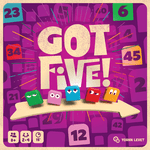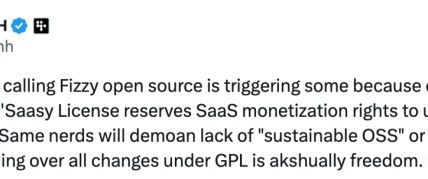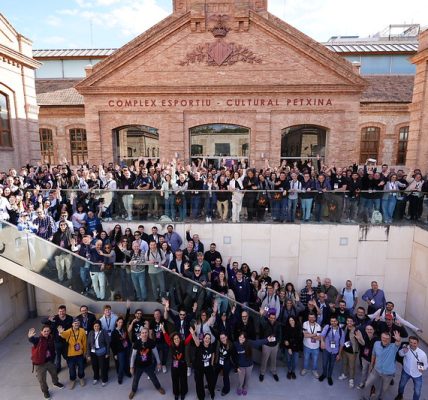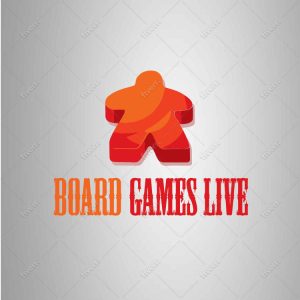At SPIEL Essen 25, the European branch of Blue Orange Games gave me an overview of recent and upcoming game releases, with Got Five! — due out in March 2026 — being a Yoann Levet deduction game aimed at a younger audience than a design like Turing Machine.
Each player takes one tile of each color, then a neighboring player arranges those tiles in order from low to high. On a turn, you reveal a tile from the face-down pool, then another player places it in the proper place in your row, giving all players a bit of information — the number on the revealed tile — and you a bit more, namely which colored tiles are higher or lower than the revealed tile.
Whenever you think you’re ready to guess your five tiles, let others know you “got five!”, then see whether you’re correct.
Non-final art and materials
Note that all listed release dates are for Europe. I need to consult with Blue Orange Games in the U.S. regarding which games might be released on the North American continent and when.
▪️ Another exclamatory game in the Blue Orange line-up is Shout the Clue!, a co-operative party game from Valéry Fourcade in which you will be somewhat helpful to your fellow players.
Each turn, a decoder reveals a target word to the other players, with these informants being able to give clues to this target word only within the constraints of the category — professions, materials, verbs, places, etc. — that you hold. Ideally your collective efforts will help the decoder discover the proper word in time.
Shout the Clue! is due out in June 2026.
Non-final art and materials
▪️ Another shouty title is Sounds Like You!, a party game for up to ten players from Yohan Callet and Bandjo that was released in Europe in late 2025 and is being distributed by BOG.
Each player has two ME cards, two YOU cards, one ME ME ME card, and one YOU YOU YOU card. In a round, one player draws a question card, then reads one of the two questions on it, such as “Who has the most friends that they used to work with?”
Thinking about how your left- and right-hand neighbors would answer this question, you lay one of your cards face down by each neighbor. If the two of you reveal a ME-YOU combo, then you’re in sync with one another and each gain a point; if you reveal ME-ME or YOU-YOU, then you both score nothing. You can use the ME ME ME and YOU YOU YOU cards once during a game, scoring an additional point if correct.
Whichever pair of players reaches the top of their score chart first wins!
▪️ Ice Split is a card game for 2-4 players credited to BLOB, which is shorthand for the designers Luca Bellini, Carlo Emanuele Lanzavecchia, Walter Obert, and Luca Borsa.
Given the quartet of Italian designers, you might not be surprised to learn that the “ice” you’re splitting is gelato. Each card features an objective on the left and a gelato flavor on the right, and each time you acquire a card you slide it under the left or right side of your row depending on what you want to keep. Once you have thirteen cards, your service is complete, and you tally your score.
Ice Split is due out in May 2026.
Non-final art and materials
▪️ Not So Fast is another take on the hare-and-tortoise fable, with each of the 2-4 players in this Guido Albini and Martino Chiacchiera design secretly backing one of the five colors of animals.
On a turn, draw a card from the deck to reveal a color or animal, then move the token of your choice that matches the revealed card one space, possibly carrying other figures atop the one being moved. When an animal reaches a space in the finish lane, it’s done moving, and once all seven spaces are filled, players tally their points, with animals that finish later being worth more points and with tortoises earning more points than hares.
Non-final art and materials
▪️ Other items coming from Blue Orange (EU) include new versions of Dan Levy‘s Ruckus in February 2026 — marking more than two decades of longevity for this frantic card game — and Ryan Wallace‘s What’s The Point?: The Cactus Card Game under the more minimalist name Cactus Game in March 2026.
Thierry Denoual‘s Gobblers, another 20+ year old design, is out in a streamlined, graphic-free design, while Claude Leroy‘s Gygès is back on the European market in a version that celebrates its 40th anniversary, even if not states as such. For those not familiar with this game, an overview:
Played with tournament rules, you cannot win on an opponent’s mistake, but rather only by creating a situation in which your opponent cannot block multiple winning combinations.

/pic9149554.png)
/pic9194827.jpg)
/pic9081186.png)
/pic9194907.jpg)
/pic9079253.png)
/pic9194950.jpg)
/pic9079254.png)
/pic9194986.jpg)
/pic9081187.png)
/pic9195045.jpg)
/pic9073505.png)
/pic9079266.png)
/pic9067726.png)
/pic9195150.jpg)




